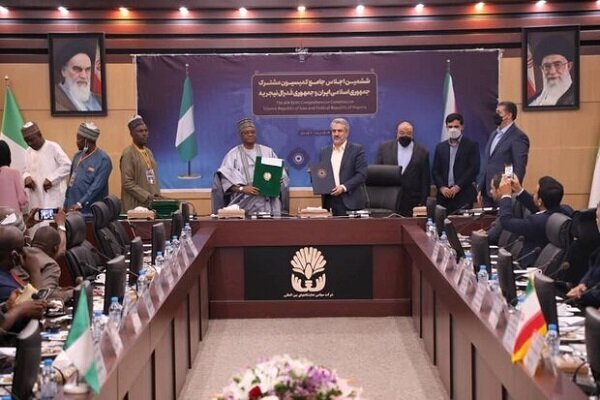Iran, Nigeria sign 8 co-op MOUs to conclude 6th Joint Economic Committee meeting

TEHRAN - Iran and Nigeria signed eight memorandums of understanding (MOUs) for cooperation in various fields including culture, tourism, oil, agriculture, sports, and trade, IRIB reported.
The MOUs were signed during the two countries' sixth Joint Economic Committee meeting which was held in Tehran on Wednesday.
The meeting was chaired by Iranian Industry, Mining, and Trade Minister Reza Fatemi-Amin and Minister of State for Foreign Affairs of Nigeria Zubairu Dada.
During the meeting, the two sides emphasized taking advantage of the high potential and capacities of bilateral relations in various fields to implement documents and MOUs inked between the two countries.
Speaking in this meeting Dada mentioned his meetings with senior Iranian officials during his stay in Tehran and said: “We had meetings with the first vice president and other Iranian officials and very positive talks were held in these meetings.”
Dada stated that Nigeria attaches great importance to its relations with the Islamic Republic of Iran, stressing that there are good potentials and capacities for mutual cooperation.
“If we use these capacities, it will be in the interest of both countries,” he said.
He further expressed dissatisfaction with the current level of economic relations between the two countries and said: “Despite the opportunities and close relations between the two countries, the economic relations between the two sides are not satisfactory and are not in a good position.”
“I hope this committee meeting will be a basis for the development of economic relations between Iran and Nigeria,” he added.
Headed by the country’s Minister of State for Foreign Affairs, a high-ranking delegation from Nigeria arrived in Tehran on June 6 to attend the two countries’ Joint Economic Committee meeting.
With a population of more than 220 million, Nigeria is the most populous country in Africa. The country’s gross domestic product exceeded $430 billion in 2021, making it Africa's largest economy.
Nigeria is Iran's third-largest trading partner in Africa, however, considering the friendly relations between Tehran and Abuja and the two countries' great potential the level of bilateral trade is not favorable.
According to Iranian Industry, Mining and Trade Ministry data, the value of trade between the two countries increased from $5 million in 2019 to $18 million in 2020 and to more than $130 million in 2021.
Despite a 26-fold increase, the level of trade between Tehran and Abuja is still unsatisfactory and could be much higher.
Transportation is one of the most important obstacles to Iran's trade with African countries, and to this end, the Islamic Republic of Iran has already begun talks with Nigeria to resolve this issue and the two sides hope that the first Tehran-Abuja flight will be established in the next few months. Both sides are also considering establishing a shipping line between the two countries.
Nigeria is a large economy with vast oil and mineral resources and extensive agriculture, and its problem today is a lack of infrastructure and skilled manpower, especially in areas like energy and technology. If diplomatic relations between Iran and Nigeria continue to expand and more attention is paid to trade development, Nigeria could become a great market for Iranian companies in a variety of fields, from the petrochemical industry to the food industry. It could also act as a regional hub to facilitate trade between Iran and West African countries.
EF/MA
Photo: Iranian Industry, Mining and Trade Minister Reza Fatemi-Amin (R) and Minister of State for Foreign Affairs of Nigeria Zubairu Dada hold sign MOU documents at the end of the two countries’ Joint Economic Committee meeting.
